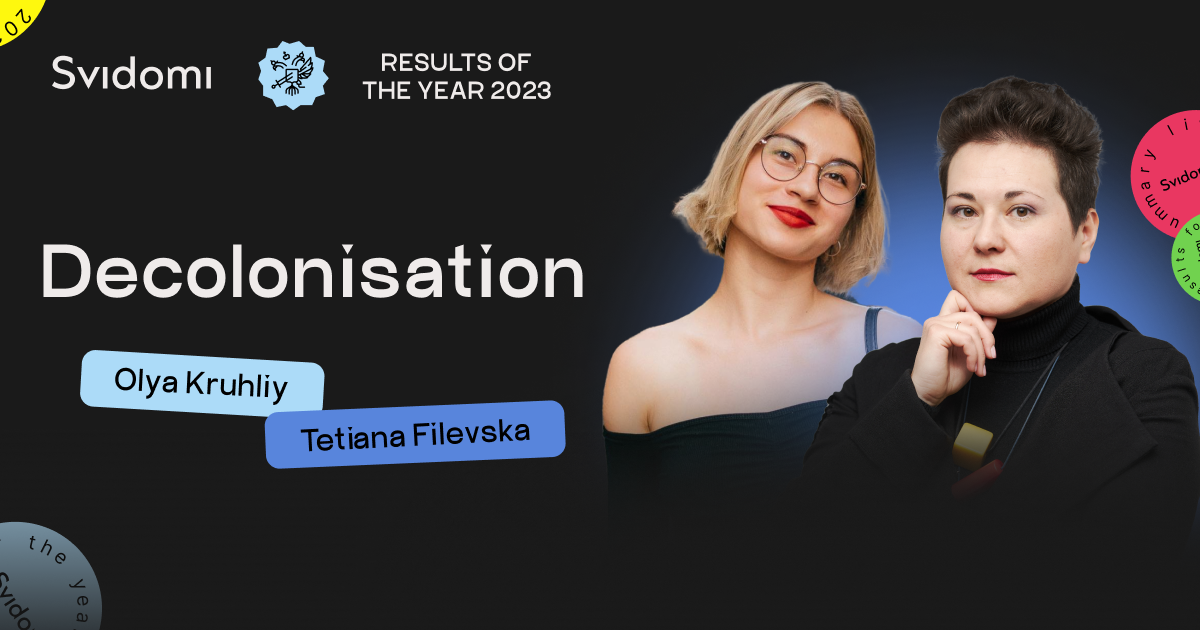Results: Decolonisation. Tetiana Filevska

For the fourth year in a row, Svidomi online media has been holding summary shows at the end of December to reflect on what has changed in Ukraine over the year in various areas: military, culture, education, foreign and domestic policy.
We discussed decolonisation with Tetiana Filevska, the creative director of the Ukrainian Institute.
What is decolonisation?
Decolonisation has several forms. One of them is theoretical, characterised by postcolonial discourse. Decolonisation is also an international movement that seeks to get rid of everything that has the character of imperial domination. These processes came from Latin America, whose countries were colonies of European empires.
In Ukraine, decolonisation is part of the liberation struggle against Russian domination. Initially, decommunisation processes began in Ukraine in 2014, but after the full-scale invasion, a new wave of decolonisation processes began, as many Ukrainians realised that Russia was the enemy. Before that, consuming Russian products was the norm, and society tolerated it.
Decolonisation laws
Ukraine has adopted two important documents: The 2015 Decommunisation Law and the Decolonisation Law, which came into force in the summer of 2023. The latter provides for changing the names of streets, settlements, etc. In general, it aims to remove everything Russian from our country.
However, decolonisation is a grassroots movement, and it is impossible to fix everything in a law. Society itself has to realise why these processes are essential. We can remove all the monuments to Pushkin, but people can continue to read him at home. First of all, decolonisation is about working with consciousness.
Progress in the decolonisation process in 2023
The most important thing here is the change of the coat of arms on Mother Ukraine (a monumental Soviet-era statue in Kyiv — ed.) from the Soviet one to the trident. This change was accompanied by a discussion, which is extremely important. Decolonisation is also a discussion, and all opinions are valuable in this process. For example, there were those who said that the monument to Mother Ukraine should be removed because it was Soviet. Some did not associate it with the past, and for them, it, on the contrary, became a symbol of protection and resilience.
Cultural and educational achievements
The Ukrainian Institute is currently working on presenting the Ukrainian issue on various global platforms. The Ukrainian Institute is working with foreign partners on a decolonisation guide for international museums on presenting Ukrainian heritage. A similar guide has already been created in the UK but does not include our region. It is because Russia is not a classic empire in the European sense. The colonies of European countries have always been overseas, and the inhabitants of those colonies differed in skin colour from those who lived in the metropolis. They also differed in their level of development. Ukraine was a Russian colony, but the level of development here was higher, and people from Ukraine could hold high positions in the Russian Empire or the USSR. That is why class approaches do not see Russia as an empire, but these processes are now changing.
How can we change the Russia-centric agenda?
Ukrainians must study their historical archives, write professional books and invest in professional scholars. There are already such experts, both among people from Ukraine and foreigners, such as Timothy Snyder or Anne Applebaum, who have studied our region well.
Ukrainians need to fill the information channels with our vision. The academic system is very slow and conservative. But the Ukrainian voice has become more prominent after the full-scale invasion, so we must keep this dynamic and invest in education and science.
Decolonisation processes in post-colonies
Since the start of the full-scale invasion, some changes have occurred in Central Asia and Georgia. But these processes are minor — in Georgia, part of which is occupied by Russia, or in the Baltic states, where a large amount of Russians still promote their narratives.
In Russia itself, many people lose or have already lost their identity as a result of colonising pressure. Some people believe that if Russia is shaken from the inside, it could lead to the empire's collapse.
Interaction with other post-colonies
Ukraine needs to communicate with everyone. The decolonisation principle: no one has a monopoly on the decolonisation discourse. Decolonisation belongs to everyone, and the coloniser and the colonised share the colonisation trauma.
Ukraine has long been deprived of its voice. That is why we need to communicate with the world and build connections on our own.
Interaction with residents of the temporarily occupied territories
People live in constant fear in the occupied territories. We must build trusting relationships with people there and form a shared vision of certain things. It will include the informational component, education and culture. People need a Ukrainian product that meets their needs.
The Russian language will become a tool for conveying information at specific points. This is because people in the temporarily occupied territories did not have the opportunity to learn Ukrainian. There are many cases when colonised nations continue to use the coloniser's language. For example, African countries use French.
But as long as Russia is a threat to us, its language is also a threat to us.
What should Ukrainians do on an individual level?
We have to realise our responsibility, ask ourselves questions, educate ourselves, think critically, be open to the world and build a direct dialogue with the world to eliminate the colonial past.


